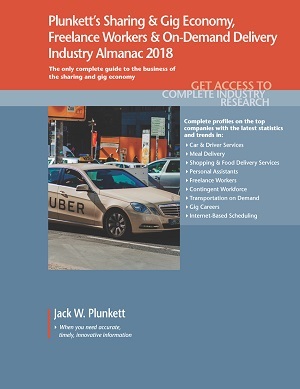The sharing economy is disrupting the nature of work, employment and entrepreneurship. Plunkett Research has found that many sharing/gig workers consider themselves to be “entrepreneurs.” While they may not have created a new company that employs others or makes products, they nonetheless are working for themselves, independently, using their own tools or vehicles and setting their own schedules. In that regard, they are literally running a business, in the same way that a one-man plumbing shop is a business. Traditional new business formation has been weak in the U.S., which is a startling change. For example, despite the fact that the American economy had rebounded reasonably well from the 2007-09 recession by 2014, the Census Bureau showed that new business formation had reached a 40-year low in that year.
We believe that the decline in small business startups is fueled by the ease of finding independent work in the sharing economy, with little or no capital or risk involved. In addition, working independently in this manner generally requires no specialized education, and no licensing beyond a drivers’ license. This type of work also lends itself very well to people, such as retirees or students, who only want to work part-time, or who want a part-time sideline in addition to a regular job. One study found that 49% of part-time independent workers also had a full-time traditional job. People who intentionally chose the independent work life often report high levels of satisfaction with their work life compared to traditional workers.
There is a significant debate underway in many nations as to whether or not people working as Uber drivers, Instacart shoppers and similar agents are actually employees, rather than contract workers. Legislative reform may well be attempted on large scale in this regard. In some cases, class action lawsuits have been filed by the contract workers. If governments rule that such workers are employees, it would have a massive effect on the business models of sharing economy firms. In the U.S., for example, it would mean that firms are subject to paying payroll taxes such as Social Security, and are subject to very high levels of labor, safety, health and anti-discrimination laws. This debate will likely continue for many years to come, and may well lead to legal reform in some nations. Another outcome may be the formation of contractor workers’ unions or union-like organizations that might demand better pay or working conditions. The “Independent Drivers Guild” now exists in New York City, representing tens of thousands of local Uber drivers, but not quite acting as a true labor union.
Sharing & Gig Economy, Freelance Workers & On-Demand Delivery Industry
At Plunkett Research Online, and
Almanac Editions: Publication: January, 2018 | Price: $379.99
Printed ISBN: 978-1-62831-478-6 | eBook ISBN: 978-1-62831-803-6
Now, more than ever before, our user tools and innovative data make Plunkett Research your go-to place for industry analysis, business trends and statistics. For any further question contact us at customersupport@plunkettresearch.com | voice: 713.932.0000 | fax: 713.932.7080


